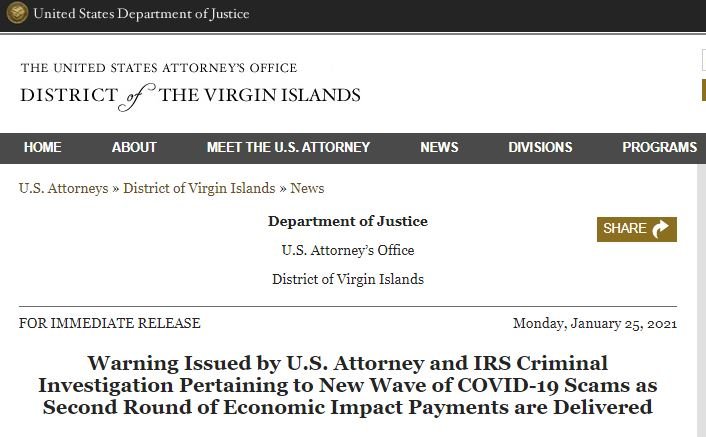The U.S. Department of Justice (DOJ) has issued a security alert related to the detection of multiple fraudulent campaigns in which scammers try to trick taxpayers seeking benefits from the second round of Economic Impact Payments (EIP), the U.S. government program aiming to mitigate the economic consequences generated by the COVID-19 pandemic.
According to Gretchen Shappert, prosecutor for the Virgin Islands district, online scammers will seek to take advantage of the issuance of this second round of payments, so all citizens will need to remain vigilant to protect their personal data and move away from any offer too good to be true: “We invite taxpayers to contact local or federal authorities if they receive suspicious content via email, text messages, phone calls or similar means,” Shappert says.

On the other hand, IRS Special Agent Tyler Hatcher mentions that the authorities are already prepared for the identification of any fraudulent campaign related to the issuance of economic and fiscal stimulus: “We have bad news for those trying to take advantage of this situation; we are fully committed to filing criminal charges against the operators of these fraud schemes.”
Among the fraud variants described by the DOJ are:
- Tricking taxpayers in order to make them share their bank accounts via SMS and steal the $1,200 USD stimulus
- Phishing schemes that, using topics such as “stimulus”, “pandemic”, “COVID-19” or “coronavirus” try to obtain confidential information from taxpayers
- Unofficial sale of false COVID-19 test kits. This also includes the sale of alleged vaccines, medications or any medical treatment
- False requests for donations for vulnerable groups
Cybercriminal groups constantly update their methods of attack, so the beneficiaries of this government support must be alert to any possible malicious activity, mainly by being informed about official government communication channels: “The IRS never calls people with threats of legal action, nor does it require the payment of taxes using gift cards or any similar means”, adds Special Agent Hatcher.
Finally, the DOJ recommends that beneficiaries of the stimulus program receive such emails, text messages or phone calls ignore requests from scammers, as well as to impose complaints with the relevant authorities. Federal authorities will continue to investigate the hundreds of reports related to these fraudulent schemes, as well as work with local authorities and international investigative agencies to locate and arrest those responsible for this crime.
He is a cyber security and malware researcher. He studied Computer Science and started working as a cyber security analyst in 2006. He is actively working as an cyber security investigator. He also worked for different security companies. His everyday job includes researching about new cyber security incidents. Also he has deep level of knowledge in enterprise security implementation.
